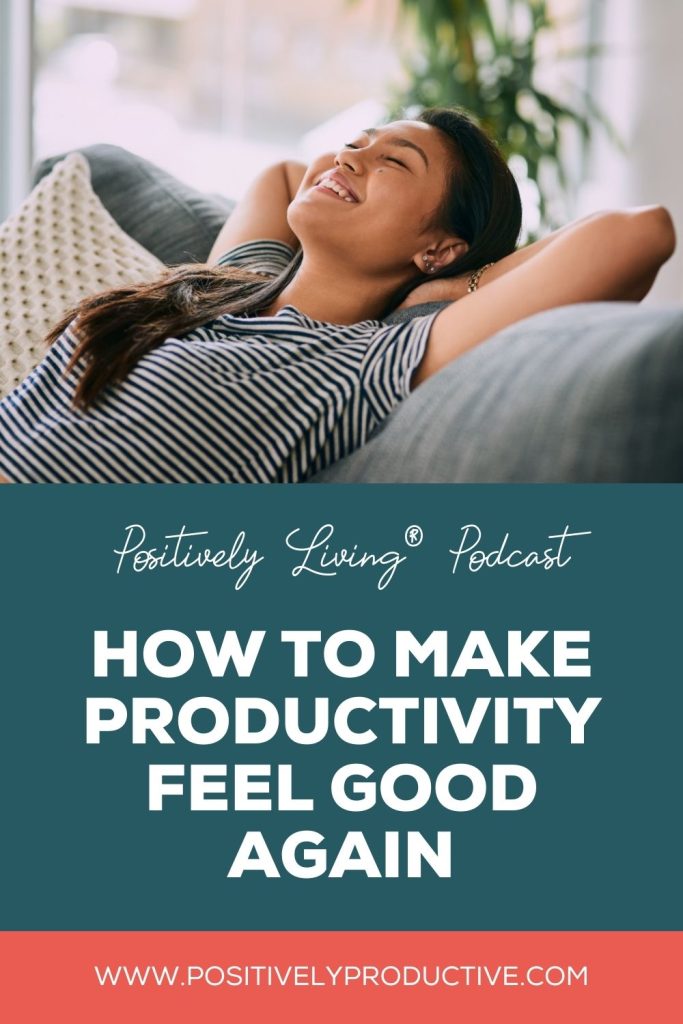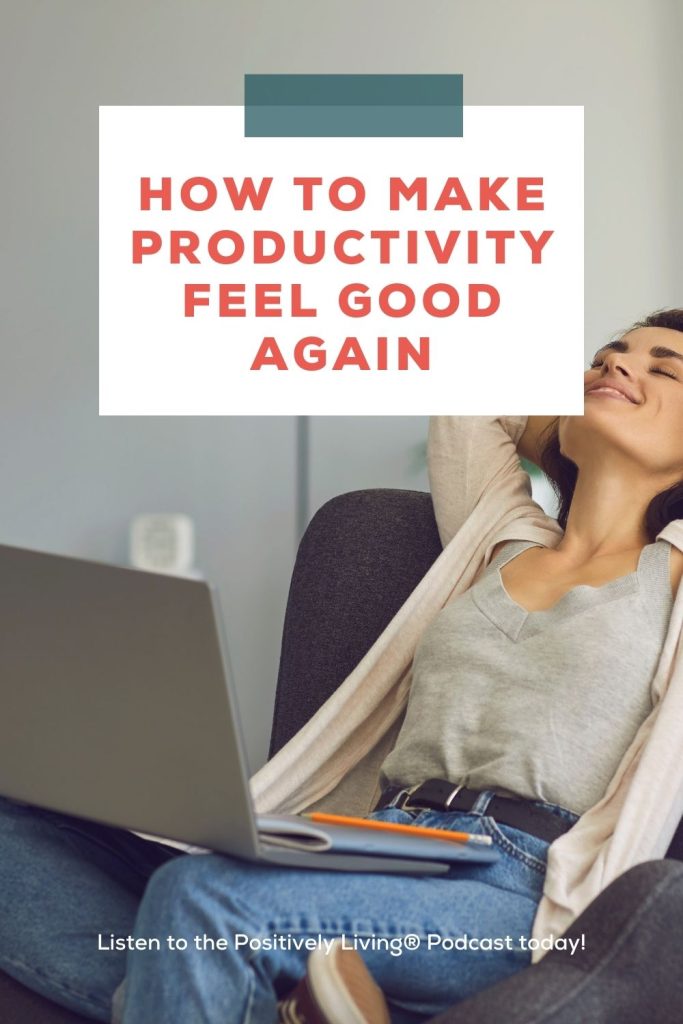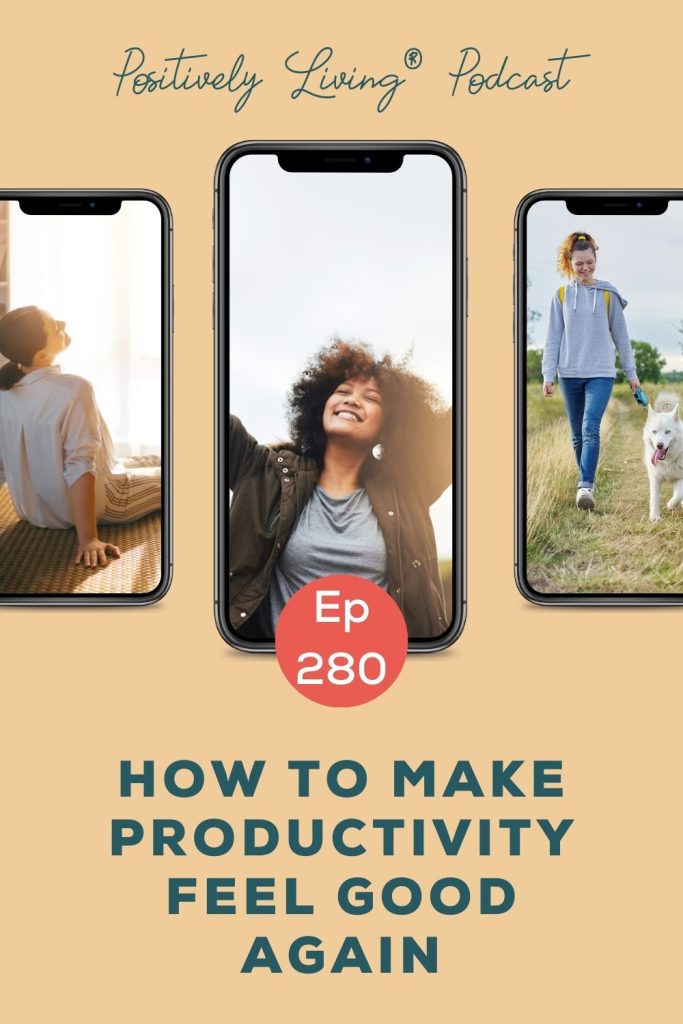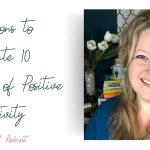Have you ever had a day where you crossed off everything on your to-do list, emails answered, errands run, boxes checked, but at the end of the day, you still felt unsatisfied? You were busy, sure, but it felt like you accomplished nothing that truly mattered. This feeling, this strange emptiness after a day of non-stop action, is a common experience that signals a critical imbalance in our lives.
We live in a culture that relentlessly praises “hustle culture” and a narrow definition of productivity. We’re told that our worth is measured by our output, our efficiency, and the number of tasks we can complete. But what if that’s only half the story? What if true productivity isn’t just about what you do, but about how you feel while you’re doing it?
In this episode of the Positively LivingⓇ Podcast, I’m exploring the two types of productivity: functional and emotional, encouraging you to challenge the traditional, functional-first approach to productivity and give you actionable steps you can take right now to integrate emotional productivity to make you feel like you’re truly living… beyond the to-do list.
The Two Pillars of Productivity: Functional vs. Emotional
The traditional view of productivity is what we’ll call functional productivity. This is the measurable, visible, and checklist-driven side of things. It’s the to-do list, the project deadlines, the household chores. It’s what companies love to track because it’s easy to quantify. When you finish a report, fold a load of laundry, or send a crucial email, you get that satisfying hit of dopamine from checking a box. This type of productivity is absolutely necessary; it keeps our lives and our work running.
But there’s a second, equally important category: emotional productivity. This is the invisible, intangible side of work and life. Emotional productivity is about the meaning, fulfillment, and satisfaction you derive from your actions. It’s the feeling of deep accomplishment you get after working on a project that truly lights you up, or the profound sense of peace you feel after a day of rest. This is why you can spend an entire weekend doing nothing “on paper” but still feel deeply refreshed and ready for the week ahead. You might have simply connected with a loved one, lost yourself in a creative hobby, or simply rested and decluttered your living space. Those days feel productive in a completely different, and sometimes more profound, way.
The Irony of Overvaluing Functional Productivity
Our society’s over-reliance on functional productivity comes from a deeply ingrained cultural bias. We’ve been taught to overvalue reason and logic while viewing emotions as a liability. This mindset has infiltrated our understanding of work, leading us to emphasize quantifiable metrics like output and efficiency, while dismissing the very things that sustain us like rest, play, creativity, and connection.
The irony is that these so-called “non-productive” activities are the very things that fuel and sustain our ability to get things done. Taking a walk, playing an instrument, or journaling isn’t a waste of time. It’s an investment in your mental and emotional well-being. It’s the self-care that prevents burnout, recharges your motivation, and makes the mundane, functional tasks of life more bearable and, ultimately, more successful. When you are running on empty, your functional productivity inevitably suffers, no matter how hard you try to push through.
Think of it like this: your energy and motivation are a battery. Functional productivity drains the battery, while emotional productivity recharges it. A healthy, sustainable life requires a constant cycle of both.
The Transformative Benefits of Emotional Productivity
When you intentionally make space for emotional productivity, a beautiful shift happens. You begin to experience a new level of engagement and resilience. Here’s what you can expect:
- You’ll Prevent Burnout: By respecting your energy and making time for what truly matters, you create a buffer against the exhaustion that comes from constant doing.
- You’ll Stay More Engaged: When you are not just a cog in the machine, but a person with a purpose, you bring more presence and passion to your work.
- You’ll Make Better Decisions: Running on empty leads to poor choices. When you are emotionally and mentally recharged, you think more clearly and make decisions that are aligned with your long-term goals and values.
- You’ll Build Resilience: Life will always have challenges. Nurturing your emotional well-being builds a deep well of strength you can draw from during tough times.
- You’ll Find True Balance: Emotional productivity helps you create a life that balances measurable achievement with genuine fulfillment.
This isn’t just about “feeling good” for the sake of it. It’s about building a life that has both momentum and meaning—a life you’re not just managing, but actively living.
Practical Ways to Embrace Emotional Productivity
Ready to shift your focus and bring more meaning into your days? Here are a few practical ideas to get you started:
- Pause and Reflect: Take a moment during your day to check in with yourself. Ask: “How do I feel about what I’m doing right now? Does this feel energizing or draining?” This simple awareness can help you identify imbalances and make small adjustments.
- Mix Functional with Emotional: As you plan your day, try to pair tasks that are measurable with those that are fulfilling. For example, listen to an inspiring podcast while you’re doing the laundry or call a friend while you’re running errands.
- Celebrate Meaning, Not Just Metrics: Instead of just focusing on your completed to-do list, celebrate what felt satisfying. Did you have a meaningful conversation? Did you make a small change that brought you peace? Acknowledge the emotional wins.
- Protect Your Energy: Your energy is a finite resource. Learn to say no to things that drain you without offering meaning in return. Consciously make time for activities that fill you up, even if they don’t produce a tangible result.
Guilt can be a major roadblock here. Many of us have been conditioned to believe that taking time for ourselves is selfish, or that what’s meaningful to us somehow competes with the need to “get stuff done.” But as the saying goes, you can’t pour from an empty cup. Honoring your emotional needs isn’t a luxury; it’s a prerequisite for sustainable success.
The next time you face a busy day, before you check off the next task, pause for a moment and ask: “Will this matter to me when it’s done?” There’s no right or wrong answer, but that simple question can shift your perspective and change everything. True productivity isn’t just about what you accomplish; it’s about building a life that feels good and is worth living.











